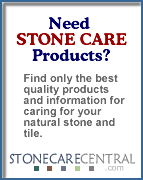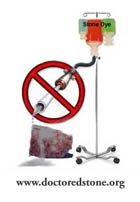 |
|
Care TipsNATURAL STONENothing compares to the elegance and beauty of natural stone. It delivers both unmatched beauty and practicality making it an investment you will never regret. But once you have it, how do you take care of it? The truth is, with very little effort, your natural stone will give you years and years of low maintenance service. Download and print our free care guide and refer to this page to arm you with everything you need to know about caring for and maintaining your natural stone and tile. ESSENTIAL CARE INSTRUCTIONS FOR NATURAL STONE SURFACESCleaning Procedures & RecommendationsGeneral Cleaning Clean stone surfaces with a neutral cleaner designated safe for natural stone. Use a clean mop on floors and a soft cloth for other surfaces for best results. Don't use more than the recomended amount of any cleaning product. Too much may leave a film, causing streaks. Change rinse water frequently. Do not use products that contain lemon, vinegar or other acids on marble, travertine or limestone as these can etch the surface of the stone. Do not use scouring powders or creams; these products contain abrasives that may scratch the surface. Floor Surfaces Dust mop interior floors frequently using a clean non-treated dry dust mop. Sand, dirt and grit do the most damage to natural stone surfaces due to their abrasiveness. Mats or area rugs inside and outside an entrance will help to minimize the sand, dirt and grit that can scratch a stone floor. Be sure that the underside of the mat or rug is a non-slip surface. Do not use vacuum cleaners that are worn, the metal or plastic attachments may scratch the surface. Consult the Care Guide or the Solution Center at StoneCareCentral.com that provides detailed instructions on properly caring for your floors Bath and Other Wet Areas Counter/Vanity Top Surfaces Counter/vanity tops may need to have a penetrating sealer applied. If a sealer is applied, be sure that it is non-toxic and safe for use in food preparation surfaces. Consult the Care Guide or the Solution Center at StoneCareCentral.com that provides detailed instructions on the care of counter & vanity tops. Outdoor Pool & Patio Areas In outdoor pool, patio or hot tub areas, flush with clear water and use a mild bleach solution to remove algae or moss. Stain Treatment and Other Issues Do's and Don'ts
|
|


